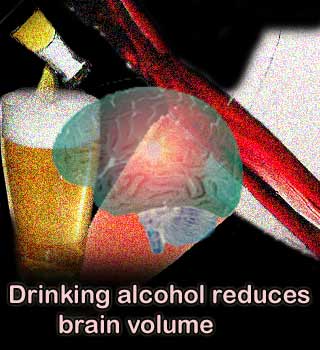
Carried out by researchers from Wellesley College, Mass, the novel study reveals that consumption of alcohol even in small amounts may trigger age-related reduction in brain volume. Shrinking of the brain has earlier been associated with dementia along with problems with thinking, learning and memory. The brain naturally shrinks at a rate about 1.9 percent per decade. It also gets white matter lesions as it gets older.
Previous researches suggest that moderate consumption of alcohol may lower the risk of cardiovascular diseases. Directed by Carol Ann Paul, M.S., of Wellesley College, Mass., and colleagues, the research included 1,839 adults with an average age of 60. These subjects were part of the Framingham Offspring Study that started in 1971 and also included children of the original Framingham Heart Study participants and their spouses.
A health examination along with magnetic resonance imaging (MRI) for these patients was carried out between 1999 and 2001. Considering age, sex, education, height, body mass index and Framingham Stroke Risk Profile, a profile that calculates stroke risk based on age, sex, blood pressure and other factors, researchers gathered information on the number of alcoholic drinks they consumed per week.
The authors remarked, “Most participants reported low alcohol consumption, and men were more likely than women to be moderate or heavy drinkers,” the authors write. “There was a significant negative linear relationship between alcohol consumption and total cerebral brain volume. The public health effect of this study gives a clear message about the possible dangers of drinking alcohol.â€
They further assert, “Prospective longitudinal studies are needed to confirm these results as well as to determine whether there are any functional consequences associated with increasing alcohol consumption. This study suggests that, unlike the associations with cardiovascular disease, alcohol consumption does not have any protective effect on brain volume.â€
Depending on how much alcohol they drank per week, the men and women were classified. Abstainers, former drinkers, or low were those who took one to seven drinks per week, moderate drinkers were those who drank eight to 14 drinks per week while high consumers of alcohol were those who consumed more than 14 drinks a week.
An analysis of these subjects revealed that most participants came in the low drinker’s category. Nearly 38% men and more than 44% women fell in this group. Compared to women, more men were classified as moderate or heavy drinkers. The researchers found that alcohol, in no way protected the normal, age-related shrinkage in brain volume. In fact the more a person drank alcohol, the more their brain volume diminished particularly for women.
More prominent in women as compared to men, the study suggests that drinking and brain volume had a strong association. The stronger prevalence of brain shrinkage in women, researchers mention could be due to biological factors. As against men alcohol is absorbed faster in women and also makes them more susceptible to its effects.
The report is published in the October issue of U.S. journal Archives of Neurology.
